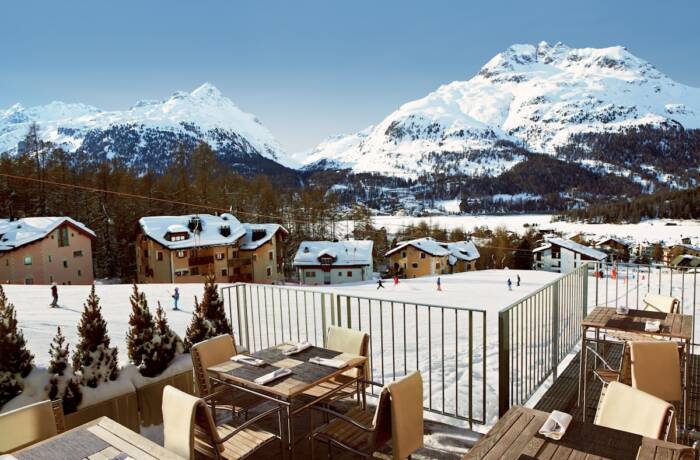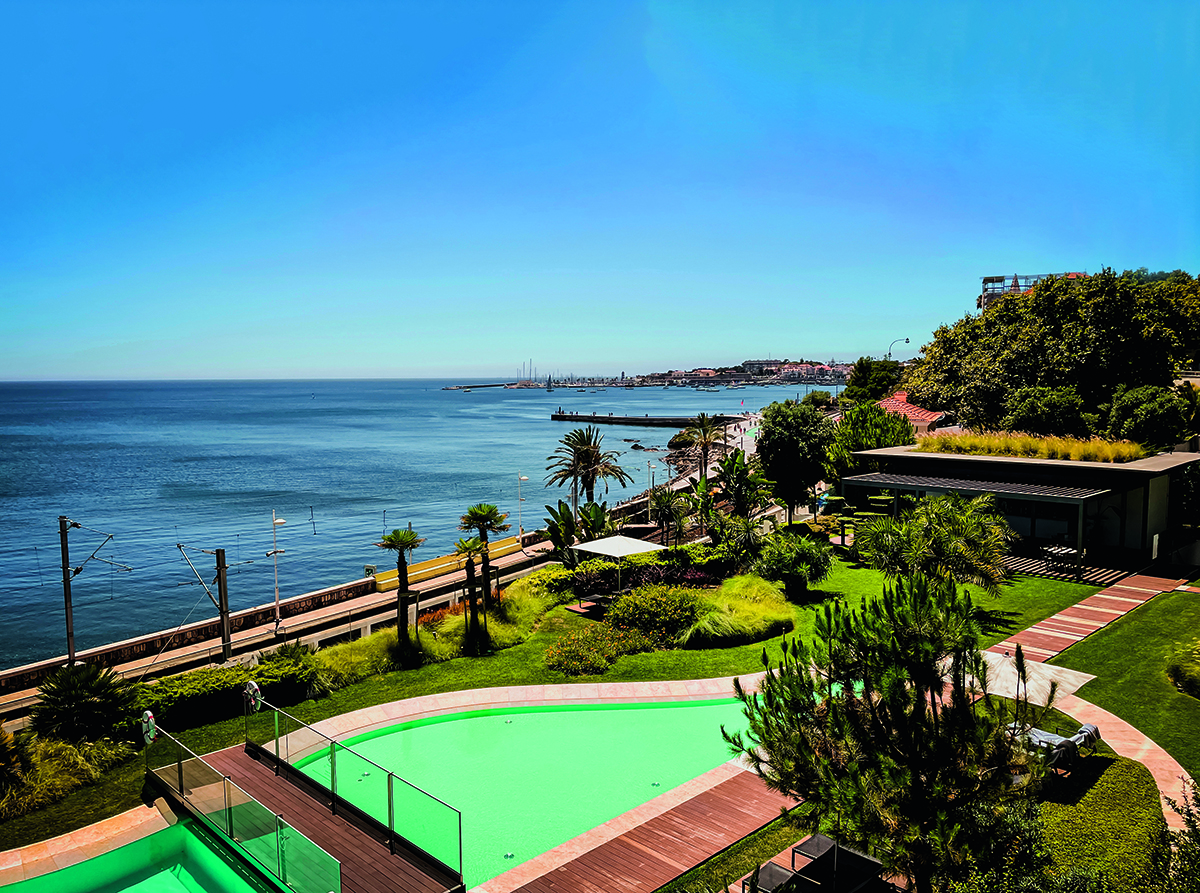
The InterContinental’s pool area
Cascais, on the Atlantic coast of Portugal, has a fabulous summer climate, culture, history, cuisine, convenience – and a bijou hotel to enjoy it all from, as LUX discovers
“You have to go to Cascais – it’s the light, and the atmosphere but really the light” says Tony, the legendary manager of the staff cafe at Vogue House, Condé Nast‘s London headquarters, and as Portuguese as salt cod.
Tony and I have had this conversation numerous times over the years. When I got my own office and PA, meaning I didn’t visit his Hatch canteen any more, we would talk on the stairs or before I hosted a client in the Vogue House boardroom, as he organised snacks.
Follow LUX on Instagram: luxthemagazine
I was intrigued not only because Tony was a local, but because he was particularly passionate about a place that is not really on the international radar. People speak of the coast south of Lisbon, or up towards Porto, but Cascais (pronounced Cash-kise), on a map, looked intriguing. It’s only 20km or so from the Portuguese capital, but past the mouth of the Tagus river and on a stretch of coast that angles sharply around into the Atlantic. It is a historic resort town and only a few kilometres from Sintra, the hilltop town that is a destination for tourists from all over the world.
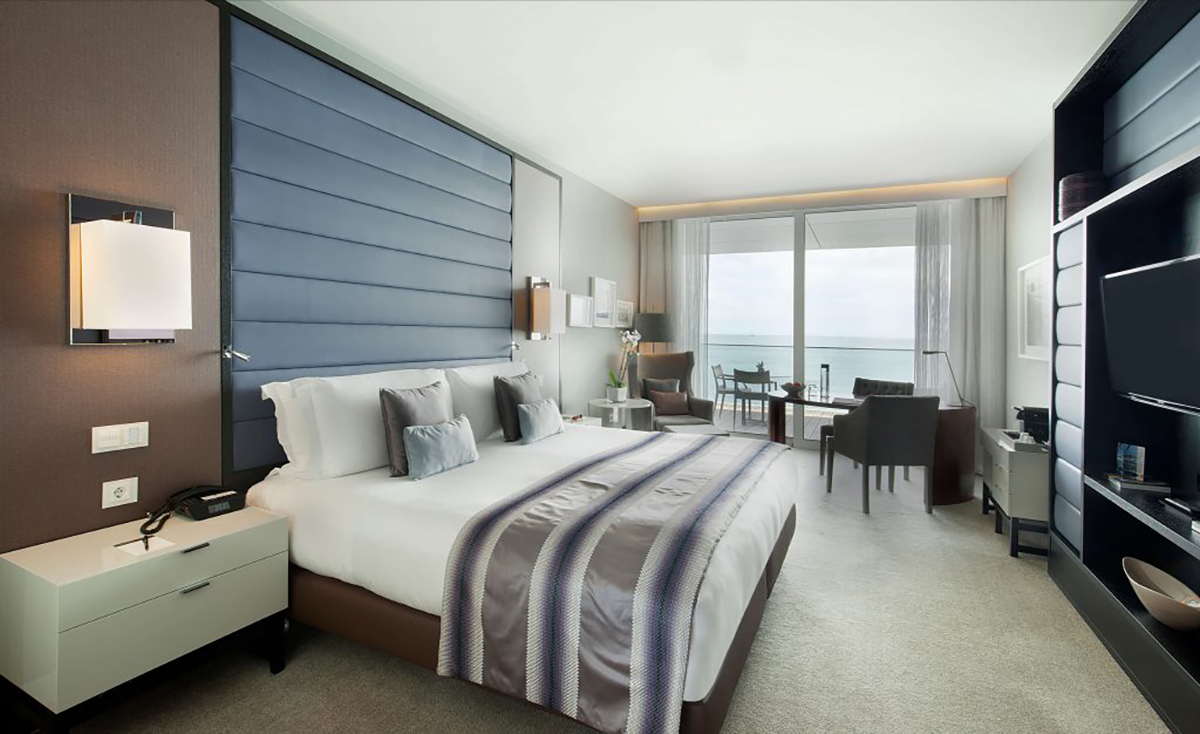
A deluxe room
Cascais being a weekend resort for the well-to-do of Lisbon, is not teeming with luxury hotels, with the exception of one: the InterContinental. This is a chain that may be more familiar to business travellers, but, as I walked into its lobby, it was plain to see that this property is aimed at a whole different world.
“The light,” I said to nobody in particular, inadvertently echoing Tony’s words. The floor- to-ceiling windows on the other side of the lobby opened out into a world of light: the green of the grass around the pool, a couple of floors below, a deep blue sea, a light blue sky that, it would transpire, turned into a kaleidoscope as the sun made its way from above the coast of southern Portugal, in the distance ahead, to set over the Atlantic, to the right. There must be some psychology involved here, on the western edge of Europe, but the light was different from the Mediterranean – less hard, more watery, somehow. Maybe it was the waves: rolling, louder, more insistent than those on the quasi-landlocked Med.
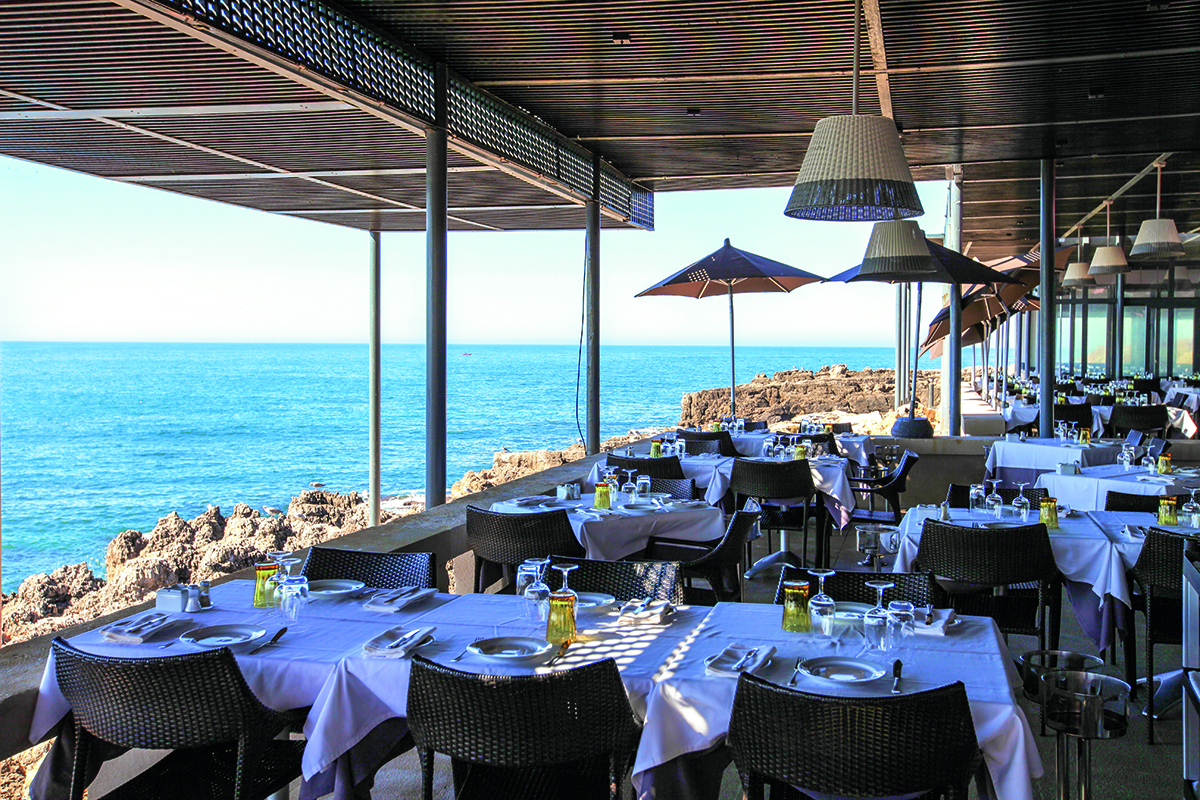
Furnas do Guincho
Maybe it was all auto-suggestion but there was nothing illusory about the pool. It sits on an island of grass and trees, above the main pedestrian promenade linking Cascais with the old resort town of Estoril. To the right was a cute little bar area – a bar, a few tables, a lawn, some flowers and trees – where we retreated on arrival, and found ourselves greeted by vast gin and tonics in stemmed bowl glasses, flavoured with a local herb that tasted halfway between basil and mint. It felt like drinking the view.
The rooms were the next surprise, and in the best possible way. There is no generic corporate style here: instead, large, high- ceilinged, contemporary-touch bedrooms with floor-to-ceiling windows onto big balconies. The blue fabric wall behind the bed matched the sea; elsewhere the room was light greys, taupes, bronzes and swathes of blue. The effect was utterly relaxing: we enjoyed the balance of comfort (top quality beds, excellent functionality) with design flair, individuality and the sense of being in a particular place. And with the balconies looking out over the pool, promenade and sea, it was very peaceful. There was, we noticed on the second day, a little local train line beneath the pool area and by the promenade: it gave a sense of character, rather than detracting from the experience.
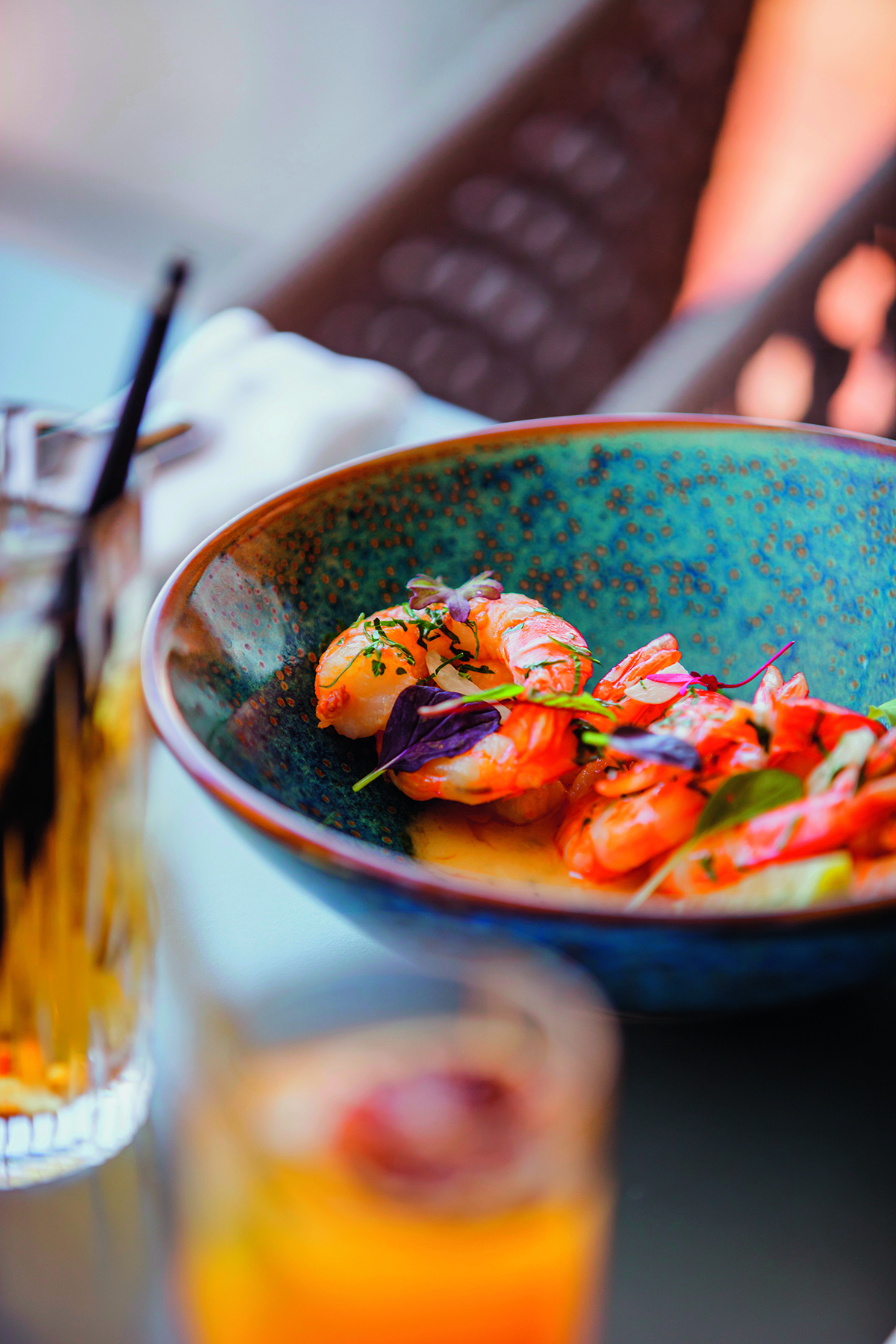
The hotel’s fried Mozambique. prawns à ǵuilho
You could lie by the pool all day, loungers on grass, and sip basil-mint gin and tonics. One observation we made, when visiting in mid-summer, while the sky was clear and blue with uninterrupted sun every day: it was notably less scorching than on any Mediterranean coast. Daytime temperatures were about 28C (82F), maybe 10ºC cooler than the average temperature in August in Turkey, Greece or Sardinia.
This means you have more energy, and no need to retreat inside for air-conditioning (itself
part of the vicious circle of global warming), which meant we descended the private staircase to the promenade and walked to Cascais’s old town, a kilometre or so along the seafront, every day. It’s a bijou place, with small café and restaurant terraces, a little beach, and a warren of backstreets housing craft shops and speciality dining, from sushi to local seafood.
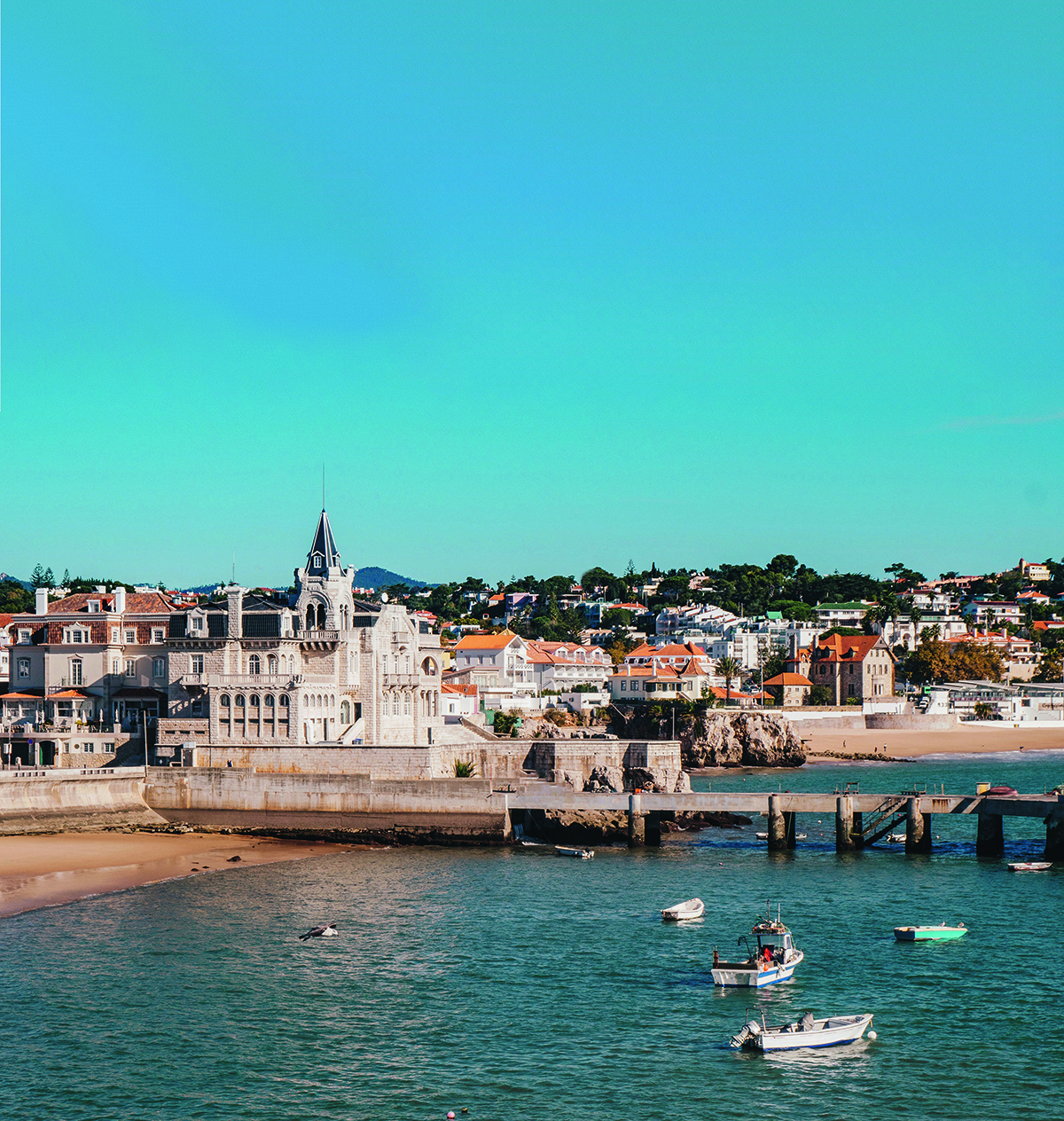
Cascais old town
Beyond the town centre, a taxi ride away, is the most spectacular restaurant in Portugal, Furnas do Guincho. Its huge terrace seems to hover over the rocks at the point where the coast turns northwards and the Atlantic hurls its full force at Europe – not a place to swim in the sea, but a memorable place to sample a mixed-grilled shellfish platter or specialities (all caught the same day), such as red snapper or grouper.
The restaurant at the InterContinental was less dramatic, but even more pleasing to sit in, for the sense of serenity. On a higher floor than our room, the small private terrace looked out to a sweeping view from the outskirts of Lisbon, along the coast, to the left, to the ocean beyond Cascais’s colourful roofs, to the right. The décor consisted of light-yet-opulent blues, greens and bronzes – everything open to the light. Equally refreshing was the food: grilled, locally caught sea bream with a hint of lemon and thyme.
Read more: Luxury Travel Views: Mandarin Oriental Ritz, Madrid
Step outside the lobby, at the front of the hotel, and you’re on a busy main road, which you wouldn’t think existed from the other side (that’s clever architecture for you). It was convenient, though, for trips to the hilltop palace-collection at Sintra, and to the Lisbon Oceanarium, Europe’s largest indoor aquarium. And for getting to the hotel in the first place: the InterContinental is a 30-minute taxi ride from Lisbon’s international airport. It’s rare to find a luxury resort-hotel in Southern Europe so close to a major transport hub, meaning it beckons as a weekend break as well as a summer holiday destination. I had better let Tony know: he was right.
Written by Darius Sanai
Find out more: estorilintercontinental.com


